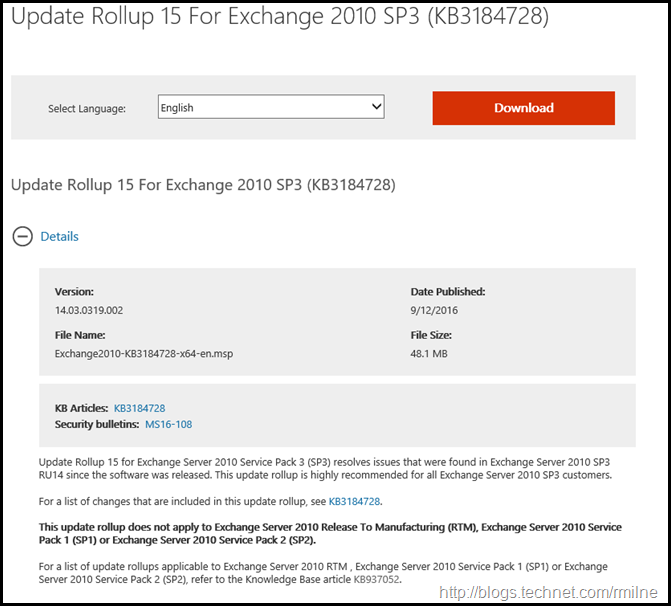Patch Tuesday this week heralded the arrival of Rollup Update Rollup 15 (RU15) for Exchange Server 2010 Service Pack 3. RU15 is the latest rollup of customer fixes available for Exchange Server 2010. The release contains security fixes to address the issues in Microsoft Security Bulletin MS16-108, in addition to the previous fixes in RU14 and older. Since security updates are delivered via a RU for Exchange 2010 and 2007, this is why a new RU was released. Exchange 2013 and 2016 have a different release model, where security updates are decoupled from the standard cumulative updates.
To fix the issues on Exchange 2007, SP3 RU21 was released for that version of Exchange. Separate security updates are available for supported versions of Exchange 2013 and 2016, and are linked from the security bulletin.
This is build 14.03.0319.002 of Exchange 2010, and KB 3184728 has the full details for the release. The update file name is Exchange2010-KB3184728-x64-en.msp.
Note that this is only for the Service Pack 3 branch of Exchange 2010. Why? Exchange 2010 SP2 exited out of support on the 8th of April 2014 and will no longer receive updates. Customer must be on Exchange 2010 SP3 to receive updates.
Also note that Exchange 2010 transitioned into its Extended product support lifecycle phase on the 13th of January 2015. Exchange 2010 will now be serviced as per the extended support policy.
Issues Resolved
This RU contains the security fixes as listed in MS16-108
The below contain the details behind the issues:
Microsoft Exchange Information Disclosure Vulnerability - CVE-2016-0138
Microsoft Exchange Open Redirect Vulnerability - CVE-2016-3378
Microsoft Exchange Elevation of Privilege Vulnerability - CVE-2016-3379
Important Notes
The below are the normal notes to consider before deploying an Exchange RU. In this case, the below must also be tempered with the fact that there are security fixes.
There are a couple of items to mention:
- Test the update in your lab before installing in production. If in doubt test…
- Ensure that you consult with all 3rd party vendors which exist as part of your messaging environment. This includes archive, mobility and management services.
- Ensure that you do not forget to install updates on management servers, jump servers/workstations and application servers where the management tools were installed for an application. FIM and 3rd party user provisioning solutions are examples of the latter.
- If the Exchange server does not have Internet connectivity then this introduces significant delay in building the Native images for the .Net assemblies as the server is unable to get to http://crl.microsoft.com. To resolve this issue, follow these steps:
- On the Tools menu in Windows Internet Explorer, click Internet Options, and then click the Advanced tab.
- In the Security section, click to clear the Check for publisher’s certificate revocation check box, and then click OK.
We recommend that you clear this security option in Internet Explorer only if the computer is in a tightly controlled environment. When setup is complete, click to select the Check for publisher’s certificate revocation check box again.
- Install the update from an elevated command prompt
- Ensure that the Windows PowerShell Script Execution Policy is set to “Unrestricted” on the server being upgraded or installed. See KB981474.
- Update Internet facing CAS servers first
- Backup any OWA customisations as they will be removed
- Uninstall any Interim Updates (IUs) before installing the RU. You will have received these private files directly from Microsoft.
- Disable file system antivirus prior to installing the RU.
- Restart server after RU has been installed and then re-enable file system antivirus
- Test (yes, technically this is in here for a second time but it is very important!)
Cheers,
Rhoderick
